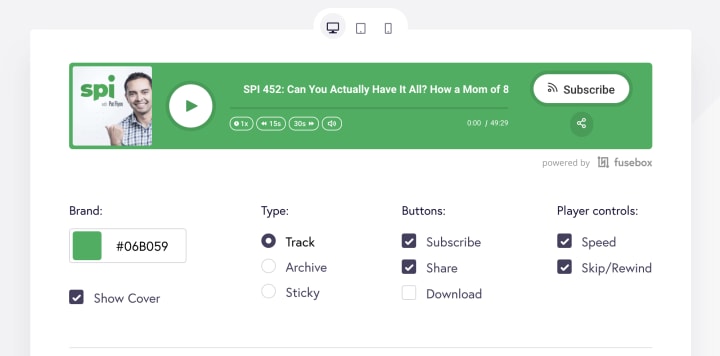7 Ways to Monetize Your Podcast
It’s a question all podcasters want the answer to … can my podcast really show me the money? And in this rapidly growing, crowded digital landscape, how much money are we talking about? Is the hope of making a living as a podcaster truly possible?

Simply put, “Yes!”
But before you quit your day job and dive into producing audio full-time, there are a few things you need to know going in.
Yes, it’s possible to make money from podcasting, but if you’re just starting out, you’re going to need to tailor your expectations. Revenue in podcasting all comes down to how many people are listening and engaging with your content.
Let’s look at some of the stats:
The average podcast gets around 141 downloads in the first 30 days.
The most successful podcast episode had around 50,000 downloads in only 30 days.
An episode with 9,000 downloads earns a place in the top 5% of podcasts, and 3,400 downloads gets you in the top 10%.
How does your podcast stack up to these stats? One of the most important things you can do before expecting bigger monetary gains from your podcast is focusing on growing your audience and your followers.
And then, once you do start growing, you can employ one, several, or all of the seven paths below to start seeing some green.
1. Direct Listener Support
Ask and you shall receive. This is one of the most common ways podcasters can earn money from their craft. This is where you ask your listeners to support your show and provide you with funding to help you continue producing quality content.
If your audience is really enjoying your content, you need to make it easy for them to drop a few dollars your way. In return, you can offer them incentives and perks, like exclusive access to future episodes, premium content, membership in a private FB group, or give them a shoutout on the next episode if they contribute a certain dollar amount.
Some podcasters take this one step further and create paid membership tiers. You can create incentives with each tier with amazing branded swag and give your listeners “platinum” status for being a valued patron.
Simply set up an account through a site like Patreon or PayPal and Stripe and you could be off and running in very little time. It doesn’t have to feel sleazy or salesy either. Think of this as GoodWill for your podcast and your audience encouraging you to keep producing content that they really love.
Some examples of podcasts that use this funding approach are This American Life which uses a very simple giving page, Hubcast, a non-profit podcast, relies solely on donations and uses a very simple web form to capture email and payment information, while WeHateMovies goes with the membership tier approach and adds additional bonuses and incentives for each higher tier.

2. Invest in Your Brand by Using the Right Tools
You already know that it’s not cheap to develop a podcast brand, but you also know the old saying ... you’ve got to spend money to make money.
Though that’s usually true, you can still be smart about where you outsource your help. Invest in products like Fusebox that will allow you to grow listenership and make money at the same time. Fusebox transforms your website into a podcasting powerhouse with their podcast player and tools to expand your platform.

With features that allow listeners to easily browse your archive, access transcripts of old shows, and subscribe from your website, you’re sure to boost traffic and grow your audience.
Fusebox has both free and subscription products, so even if you’re new to podcasting, your fans won’t be able to distinguish you from the seasoned pros. Fusebox is known for providing a discount on their Pro player for annual subscribers, though, so take advantage!
3. Sponsorships and/or Advertisements
You know when you’re listening to a show and the podcast hosts, says, “this episode is brought to you by …?”
This is yet another way podcasters can make money ... by partnering with another company to give air-time to their products or services on the show. The radio business has been doing this for over a hundred years.
The larger your listener base is the more an advertiser is going to be willing to pay for time. Advertisements are paid on a CPM (cost per 1,000 downloads) model. On average, advertisers will pay between $20-$100 per CPM.
So, let’s say you have a podcast episode that averages around 50,000 downloads and the advertiser is willing to pay you $30 per CPM. Some basic math will show us:
50 X 30 = $1,500 per episode
If you do more than one episode a week with more sponsorships you can increase the number of downloads and obviously, those numbers can get much higher much faster.
Where can you go to find sponsorships? Some podcasts will use brokers to help them find the right companies to partner with. Brokers like Midroll, Authentic, and Advertise Cast can be good starting points to see what kind of sponsorships are available based on your specific content.
Who’s the podcaster that does this the best? The Joe Rogan Experience.
Joe’s podcast alone generates up to $30,000 in ad revenue per episode. He usually creates 3-5 episodes per week, which ultimately nets him around $90-150,000. Combine this with the YouTube monetization of his show and the recent deal he signed with Spotify, and you can see why he’s the reigning king in this space.

4. Become an Affiliate Partner
Affiliate sales occur when you mention a product or service on your show, direct your listeners to a special URL and you get a percentage of that sale. This can be a link you mention on the podcast or include in your show notes, description, transcripts, or directly from your website.
Affiliate marketing can be a great alternative to new podcasters who haven’t hit their download rhythm yet and aren’t able to start talking about sponsorship opportunities. It can serve as a great precursor for future sponsorships to be able to show those bigger companies what kind of revenue you can generate from your budding podcast.
One of the benefits of being an affiliate partner is that you get to pick and choose what kinds of things you want to promote, and with what frequency.
Many companies like Amazon and Target have open affiliate programs that you can apply to, but be aware some of them are only “referral programs” where you will essentially earn store credit instead of cash. Some of the bigger affiliate companies will require that you have a certain number of followers before you can join.
Do your research and choose the products and services that you’re passionate about and enjoy talking about. Promote products that you’ve used first hand and make sense for your brand.
If you want to learn from the best when it comes to affiliate marketing, Pat Flynn is your man. His two podcasts combined generate over $100,000/month in affiliate revenue. You can learn about his affiliate strategy in the Smart Passive Incomes Guide to Ethical Affiliate Marketing.
5. Sell Premium Content
Another interesting trend has been to sell premium content of your podcast to people that want to go deeper. This is where you can create specialized content like additional recordings with popular guests, Q&As, live content, and early access to new episodes … and then make it available for purchase.
This can be really simple to create.
When you’re recording your next episode, set aside some additional time to create some extra content with your guest and that becomes “premium” content as an extra incentive. This could work especially well if you have a popular guest that gets a lot of engagement.
6. Sell Your Own Branded Products
When you have a big enough fan base that is hungry to spread the word about your podcast, this can be a great way to build your brand and provide something unique and fun for your audience.
Sell t-shirts, ballcaps, mugs, pens, a personalized red stapler, whatever is appropriate for your show and make it available to purchase from your site. Think of your podcast as the rock star and set up your merch table!
7. Repurpose Your “Old” Content
Have you covered a topic that was particularly interesting or something that really resonated with your audience? Use it again, but give it a face lift!
Take the copy, add some images to pretty it up, and offer it as an eBook or downloadable resource that people can purchase. You can do this by taking the content that’s already there in the transcript.
The free Fusebox plug-in makes this incredibly easy with its built-in transcription feature. Plus, give your visitors and new listeners access to explore more of your content in a simple and attractive interface.
Wrapping up:
Yes, podcasters can make money and there are some really fun and inventive ways to go about it. There is some planning and intentionality that needs to be done on your part to determine what is really going to work the best and what makes the most sense for your brand, your content, and your audience.
Reach out and let us know what is working for you and some of the unique ways you’re finding to make money from your podcast. We are proud to support this amazing community of podcasters and we’re committed to helping each other grow and be successful!
About the Creator
Denise Langenegger
Denise Langenegger is part of the team at Instasize – a content creating tool kit for anyone editing photos and online content on mobile.
Instagram: @instasize.official
Twitter: @Instasize






Comments
There are no comments for this story
Be the first to respond and start the conversation.